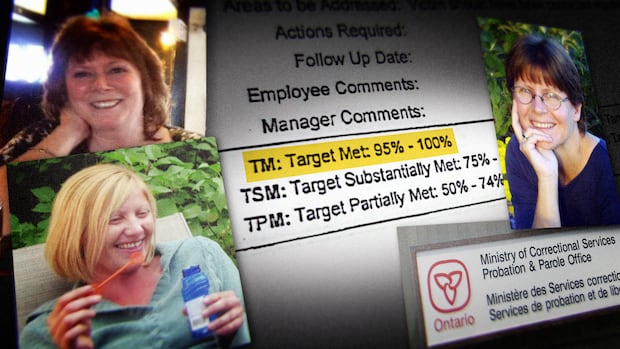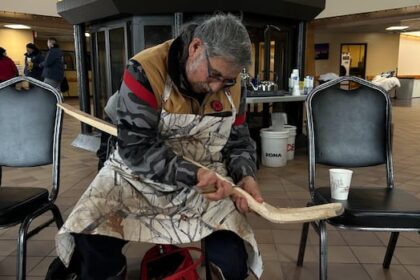Exclusive details raise troubling questions about Ontario’s probation systemCBC News Ottawa has exclusive new details about how Ontario’s probation system managed one of the worst domestic violence offenders in Canadian history before he murdered three women in and around Renfrew County.“Target met: 95% – 100%.”That’s the score a manager gave Basil Borutski’s probation officer, two days after Borutski murdered two ex-partners he was on probation for abusing — Anastasia Kuzyk and Nathalie Warmerdam — as well as Carol Culleton on Sept. 22, 2015.For nearly three years leading up to the slayings in the Ottawa Valley, Borutski’s probation officers in Renfrew and Pembroke, Ont., were tasked with making sure the repeat domestic violence offender followed court orders after serving jail time for threatening Warmerdam’s family, and choking and assaulting Kuzyk.They were also responsible for liaising with partner agencies including victim advocate organizations, police and the Crown to help keep Kuzyk, Warmerdam and Borutski’s ex-wife safe. (CBC News is not naming his ex-wife because she was a victim of intimate partner violence and is still living.)A few weeks after the local manager’s “target met” assessment, a death review conducted by probation and parole managers elsewhere in Ontario found that multiple opportunities for probation officers to intervene had been missed.But two days after the murders, as headlines were still blasting the news of one of the worst instances of intimate partner violence in Canadian history, the only thing the local manager felt needed to be addressed was that Kuzyk should have been contacted monthly.The “target met” score is the highest that can be given.From left to right, Nathalie Warmerdam, Anastasia Kuzyk and Carol Culleton were murdered at their homes and cottages in and around Renfrew County a decade ago, on Sept. 22, 2015. (CBC News)“It’s just baffling, honestly,” said one of Warmerdam’s sons, Malcolm, in an interview at his home.Kirsten Mercer, a lawyer who represented victim advocacy groups at a 2022 inquest into the murders, was also dismayed.“If you can look at the events that unfolded in Renfrew County and say, ‘Yeah, we did just about everything right here,’ you are clearly measuring the wrong things,” Mercer said.“And it tells me that the level of service — what Ontarians can expect from probation in terms of [supervising perpetrators] in the community — is quite low, even when someone is a fairly high-risk.”2 management reviews done before killingsThe same area manager performed two other case reviews well ahead of the murders, in November 2013 and January 2014, CBC News has also learned.Both were opportunities to charge Borutski with breach of probation for failing to attend programming for domestic violence offenders. He had been ordered to attend before he choked and beat Kuzyk, and after he served time for the assault on her he was once again ordered by a judge to attend.His probation officer sent his forms to the program and notified Borutski of his intake appointment, but he failed to show up just three months before the murders.After those reviews, the probation officers didn’t appear to change their approach, Warmerdam and Mercer said.Borutski was never charged with breach of probation for violating conditions of both of his probations to attend a partner assault response program. Alcohol as a trigger for violence was never properly identified and treated despite both victims saying he was drinking at the time. His offence cycle was never identified, and he wasn’t considered a possible intensive supervision offender even though he met the criteria.“Enforcement decision/rationale for non-compliance was never documented nor was Mr. Borutski held accountable for his actions,” states the more detailed death review.Basil Borutski after his arrest on Sept. 22, 2015, following an hours-long manhunt in the Ottawa Valley that forced police detachments, courthouses, law offices and other institutions into lockdown. (Ontario Provincial Police exhibit/Superior Court of Justice)Public interest grounds secured probation disclosureThe new details are contained in a rare disclosure of more than 400 pages of Borutski’s 453-page probation and parole record. Ontario’s Ministry of the Solicitor General provided them to CBC in September after initially denying them, following a two-year appeal to the information and privacy commissioner.Portions about people other than the three victims and Borutski were redacted for their privacy, among other redactions for solicitor-client privilege and protecting investigative techniques.CBC is not naming the probation officers who oversaw Borutski, nor their manager. The purpose of this reporting is not to shame staff, but to outline in detail how Ontario’s probation system responded then — and to find out what has or hasn’t changed in the years since, and following the inquest — so that people experiencing intimate partner violence today and partner agencies can advocate for themselves accordingly.It’s impossible to know whether Borutski would have murdered anyone if his probation officers had acted differently. Still, Borutski’s probations were the last, best chance to keep his victims safe, and the rare ministry disclosure offers a closer look than the inquest could provide.The Ministry of the Solicitor General, which runs Ontario’s probation system, supplied Borutski’s probation file after CBC News won an appeal through the information and privacy commissioner. (Michel Aspirot/CBC)Unclear how often outside reviews are doneAn official with the Ministry of the Solicitor General told CBC that management reviews happen annually and whenever someone on probation is charged with a serious offence, for accountability and quality assurance.They’re mostly done by the local managers directly overseeing the officers being assessed, and each review generates a report outlining strengths and outstanding tasks, the ministry said.Managers from elsewhere in Ontario sometimes also review files “to ensure objectivity,” but the ministry declined to say how often that happens, or what triggers an outside review. I got the impression that [Nathalie] did not have much faith in [the probation officer] and felt that he was not really taking the risks seriously.- Victim Witness Assistance Program manager, May 2013The first management review of Borutski’s file took place Nov. 4, 2013, when he was being supervised by a Renfrew probation officer after threatening one of Nathalie Warmerdam’s family. It covered everything from his release from jail in December 2012 to the review date.Case notes show Nathalie Warmerdam, Killaloe OPP and Pembroke’s Victim Witness Assistance Program (VWAP) had all been dismayed to learn through the grapevine in the spring of 2013 that the probation officer had approved Borutski moving to Killaloe, where his ex-wife was living and Warmerdam was assisting a client.Nathalie Warmerdam, seen here in an undated photo provided to CBC by her son Malcolm Warmerdam, worked hard to make her fears for her safety known to police, the probation system, victim services and more. (Warmerdam family)’Playing games and getting away with it’A Killaloe OPP officer emailed a warning that she was concerned about his past victims, and his propensity to mislead people.“Borutski’s ex-wife lives [in the area] and she is the victim of his most recent charge when he threatened to kill her. Borutski is also a person of interest in the arson of his own home [redacted],” the police officer wrote.“This man is unpredictable and is once again playing games and getting away with it.”The VWAP manager also chimed in.“If this is true then it is very bad news,” she wrote. “I think we need to proceed with setting this up [a high-risk case review] now. There are very serious victim safety issues here.”Nathalie Warmerdam was also unhappy with the Renfrew probation officer’s work, the VWAP manager indicated.“Get ready for an earful ([Nathalie] will be respectful but she is upset at the fact that he was allowed to move to a place that puts her at risk),” she wrote.Carol Culleton’s cottage in Hastings Highlands was broken into before she was murdered. (Ontario Provincial Police exhibit/Superior Court of Justice)Reports from first case reviews missing“From my conversations with Nathalie earlier on I got the impression that she did not have much faith in [the probation officer] and felt that he was not really taking the risks seriously.”The report that was supposed to be generated from the first review by the local manager was not included in the ministry’s disclosure. It’s unclear if it was misplaced or withheld, and the ministry did not answer questions about why it isn’t there. But case notes before and after show the approach to handling Borutski did not change.The second review by the same manager happened a couple months later, in January 2014, four business days after Borutski — still on probation for the Warmerdam offences — was arrested for brutally beating Kuzyk about the head and face, and choking her, in a domestic assault that spanned hours.The day the assault was reported, probation officers received OPP incident notes in which Kuzyk said she thought Borutski was going to kill her, that he’d been drinking and that he was dreaming about killing his ex-partners.Again, the local manager’s report was not included in the ministry’s disclosure, for reasons unknown. Again, the tactics employed to rein Borutski in didn’t change.’He will not comply at all’Nearly a year later, as agencies and officials were getting ready for his release from jail in December 2014 for the Kuzyk assault, they noted he was angry and unco-operative, refused to sign his probation order and a separate acknowledgement of the order, and insisted he didn’t have anger problems.“It is my opinion that the victims are at risk from this individual. It has been my experience with Abusers such as Borutski, that he will not comply at all. You will have to Breach, Breach, Breach and Breach him forever,” wrote a jail rehabilitation officer on Dec. 17, 2014.Despite this frank advice and Borutski’s ongoing disregard for court orders, he was never charged with breach of probation by his then Pembroke probation officer. We had the opportunity to change the outcome of this story and potentially save the lives of these three women, at least at that time.- Kirsten Mercer, CKW Inquest lawyerReading the case notes, there are instances where good work was done, where you can imagine the officers’ frustration as they try to help him fulfil his obligations, to no avail.But there are multiple reports about Borutski’s manipulativeness that disprove the more detailed death review finding that there were only “subtle indications of deviance … very deep” in the file.’When I get out I’ll kill her’In a 2013 assessment of Borutski’s risk of re-offending, for example, his probation officer wrote: “VWAP, Crown and police characterize the subject as a master of manipulation.”Still, he said it was “difficult to know what was true” about Borutski’s domestic violence history, since he’d never been convicted before the Warmerdam offences. He’d been accused multiple times by his ex-wife, but was either acquitted or the charges were withdrawn or stayed.Attached to that same risk assessment, however, is a report from Killaloe OPP, saying his ex-wife’s most recent charges against him were only stayed because he’d threatened to kill her.He told Nathalie Warmerdam: “‘If [I’m] found guilty don’t wait for me, all I’ll be thinking about is killing [my ex-wife]. When I get out I’ll kill her and go back to jail but that will be OK because justice will have been done,’” the OPP report reads.His ex-wife agreed to the stay of charges only “because she feared for her safety and knows what Borutski is capable of,” OPP added.Malcolm Warmerdam, seen here at his home earlier this month, believes the problem with the probation system’s management case review tool is likely systemic. (Michel Aspirot/CBC)Changes to management review tool unclearThe case management review tool has been updated since 2015, but “the criteria for assessment and consolidation of findings are relatively unchanged,” the ministry told CBC. It declined to say what’s different.Nathalie’s son Malcolm Warmerdam thinks the problem with the reviews is likely systemic.“We heard [from the probation witness at the inquest] that a lot of things did not seem, to his understanding, to be being done the way that policy required,” he said.“Did [the probation officer] get a high score because the manager looked at it and went, knowing how high your caseload is, this was you doing more than enough?” he asked. “If this is how the case is handled, that needs to be considered a problem, wherever that problem lies.”He worries for other victims of intimate partner violence relying on probation to keep them alive. His mother worked hard to make her fears for her safety known to officials, but still ended up murdered.“I sit there and I go … when someone who can [advocate for themself] still can‘t manage to keep themself safe, I can’t imagine how hopeless that may make it seem to others [who can’t advocate].”Kirsten Mercer, the lawyer who represented victim advocacy groups at the inquest into the murders in 2022, says Ontario has some of the best expertise in the world to combat intimate partner violence. (Mehrdad Nazarahari/CBC)’We know better. It’s time for us to do better’“We had the opportunity to change the outcome of this story and potentially save the lives of these three women, at least at that time,” Mercer said. But she also gives credit to the probation system for eventually owning up to the problems in this case and trying to change.“Although I think some of the biggest gaps in terms of what went wrong [leading up to the murders] was with the supervision of this perpetrator when he was in the community, I also have to say that probation and parole has done the work … to make improvements, building on the recommendations that have come out of the inquest,” she said.Mercer and Malcolm Warmerdam have seen positive changes since the inquest: more communication between police and other agencies, and more people being invited to the table to discuss perpetrators and try to keep victims safe.But there’s a long way to go.“It is a tragedy that we have some of the most well developed expertise in the world in Ontario around the risk factors for domestic violence, and recommendations about how to make those changes,” Mercer said.“We know better. It’s time for us to do better. And anything short of that is a failure on our collective part.”
Wednesday, 4 Feb 2026
Canada – The Illusion
Search
Have an existing account?
Sign In
© 2022 Foxiz News Network. Ruby Design Company. All Rights Reserved.
You May also Like
- More News:
- history
- Standing Bear Network
- John Gonzalez
- ᐊᔭᐦᑊ ayahp — It happened
- Creation
- Beneath the Water
- Olympic gold medal
- Jim Thorpe
- type O blood
- the bringer of life
- Raven
- Wás’agi
- NoiseCat
- 'Sugarcane'
- The rivers still sing
- ᑲᓂᐸᐏᐟ ᒪᐢᑿ
- ᐅᑳᐤ okâw — We remember
- ᐊᓂᓈᐯᐃᐧᐣ aninâpêwin — Truth
- This is what it means to be human.
- Nokoma










